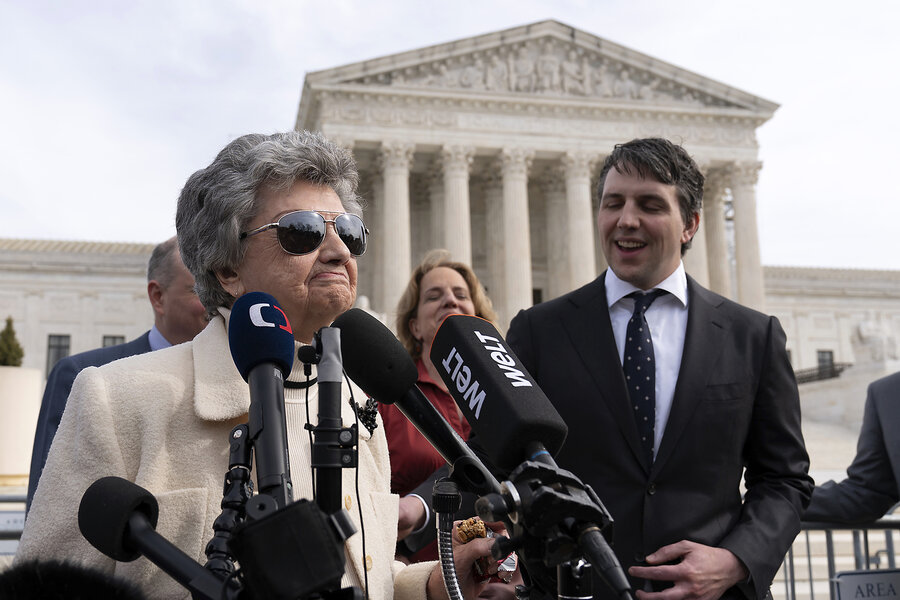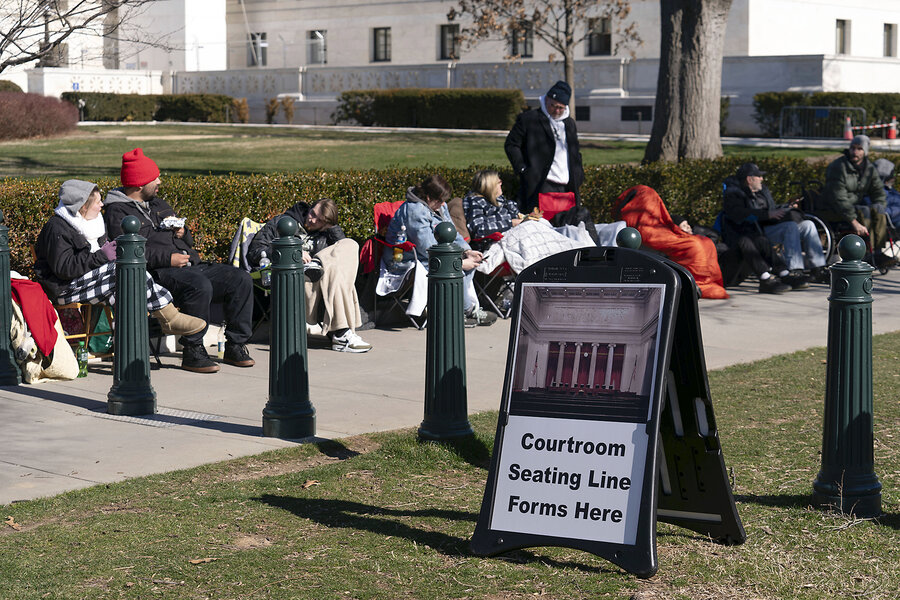In historic case, justices look ready to return Trump to ballot
Loading...
In a historic oral argument, the U.S. Supreme Court appeared likely to overturn a state supreme court ruling barring former President Donald Trump from its primary ballot.
No U.S. court had ever issued such a decision, but in December the Colorado Supreme Court ruled that Mr. Trump – the current front-runner for the Republican presidential nomination – is disqualified by Section 3 of the 14th Amendment. That provision, adopted in the Civil War’s aftermath, holds that no one who “engages in insurrection” against the United States can hold public office.
Why We Wrote This
Can a Civil War-era provision barring insurrectionists from public office mean Donald Trump can be removed from presidential ballots? The U.S. Supreme Court appeared skeptical during oral argument – and concerned more about the future than about the past.
The case argued today, Trump v. Anderson, poses a simple question: Did the Colorado Supreme Court err in its ruling?
After two hours of often skeptical questioning, it appears that a majority of the high court believes the Colorado decision should be overturned.
The Colorado Supreme Court held that Section 3 applies to Mr. Trump because of his actions on Jan. 6, 2021, when a mob of his supporters attacked the U.S. Capitol to try to halt electoral vote certification naming Joe Biden president. It also cited Mr. Trump’s efforts to cling to power, claiming the election was “stolen.”
During questioning Thursday, the justices appeared more interested in the future than in the past. Namely, what could be the potential downstream effects of ruling that one state can disqualify a candidate in a nationwide election?
In a historic oral argument today, the U.S. Supreme Court appeared likely to overturn a state court ruling barring former President Donald Trump from its primary ballot.
No U.S. court had ever issued such a decision. Then, in December the Colorado Supreme Court ruled that Mr. Trump – the current front-runner for the Republican presidential nomination – is disqualified by Section 3 of the 14th Amendment. That provision, adopted in the aftermath of the Civil War, holds that no one who “engages in insurrection” against the United States can hold public office.
The case argued today, Trump v. Anderson, poses a simple question: Did the Colorado Supreme Court err in its ruling? On the evidence of two hours of often skeptical questioning, it appears that a majority of the high court believes the Colorado decision should be overturned.
Why We Wrote This
Can a Civil War-era provision barring insurrectionists from public office mean Donald Trump can be removed from presidential ballots? The U.S. Supreme Court appeared skeptical during oral argument – and concerned more about the future than about the past.
But on what grounds?
The Colorado Supreme Court held that Section 3 applies to Mr. Trump because of his actions on Jan. 6, 2021, when a mob of his supporters attacked the U.S. Capitol to try to halt the certification of electoral votes naming Joe Biden president. It also cited Mr. Trump’s efforts to cling to power, claiming that the election he lost was “stolen” from him. But during oral argument, the justices – even the constitutional originalists – were more interested in the future than in past events. Namely, what could be the potential downstream effects of ruling that a single state can unilaterally disqualify a candidate in a nationwide election?
Chief Justice John Roberts noted that if they upheld the Colorado ruling, there would “surely” be other proceedings to disqualify other presidential candidates, some of which would succeed.
“It’ll come down to just a handful of states that are going to decide the presidential election” by barring certain candidates, he added. “That’s a pretty daunting consequence.”
“‘President’ is not there”
Justice Clarence Thomas noted that, since Section 3 was ratified in 1868, it hasn’t been applied to many federal offices. Justice Ketanji Brown Jackson, meanwhile, questioned whether the framers of Section 3 envisioned it being used in the context of a national election. The text of the provision, she added, lists specific offices it covers – including in Congress and in state government – but doesn’t mention the presidency.
Wasn’t Section 3 “about preventing the South from rising again in the context of these local elections, as opposed to focusing on the presidency?” she asked. “The thing that really is troubling to me is ... they were listing people that were barred and ‘president’ is not there.”
Other justices raised practical concerns with this potential outcome. Different states have different rules around election disputes. When Section 3 cases are raised in different states, their state courts may have different procedural rules.
“Suppose we have two different records, two different bodies of evidence, two different rulings on admissibility, two different standards of proof,” asked Justice Samuel Alito. “I’m not getting a whole lot of help from you about how this would not be an unmanageable situation.”
The “you” he was referring to is Jason Murray, the attorney for the Anderson litigants and the target of many of these questions from the high court.
Mr. Murray argued that whatever states may choose to do, Section 3 provides a “democratic safety valve” for disqualified candidates by empowering Congress to lift that disqualification with a two-thirds vote.
And while states have broad power over how they can run national elections – including how they apply Section 3 – Mr. Murray argued the Supreme Court has the authority to create nationwide standards for states to follow, just as it does with other constitutional provisions. Congress could also pass a law setting such standards.
The reason there aren’t any uniform guidelines already, he added, is because there have been so few “insurrections” in American history. But many of the justices seemed eager to avoid any colloquy related to the violence on Jan. 6 itself.
“There’s a reason Section 3 has been dormant for 150 years, and it’s because we haven’t had anything like Jan. 6 since Reconstruction,” Mr. Murray told Chief Justice Roberts.
“It seems to me you’re avoiding the question,” the chief justice replied. If the court upholds the Colorado decision, he continued, “we would have to develop rules for what constitutes an insurrection.”
“Why would that rule exist?”
The justices spent a bit more time on the question of whether Section 3 covers the presidency. The provision explicitly bars someone from being a member of Congress, an elector of the president and vice president, or holding an “office ... under the United States,” as well as anyone who has previously taken an oath to support the Constitution as an “officer of the United States.”
Jonathan Mitchell, the attorney representing Mr. Trump, argued neither of the catchall terms “office” and “officer” applies to the president. “It’s clear from the constitutional text that there are officers that do not hold offices under the United States,” he said.
“From original understanding, or a textualist perspective, [how can] those two terms, so closely related, carry such different weight?” asked Justice Neil Gorsuch, perhaps the court’s most avid textual stickler.
Justice Sonia Sotomayor, meanwhile, noted that if Section 3 did cover “officers,” it would cover almost every president in history except Mr. Trump, since he’s the only one who didn’t previously serve as a different “officer.”
“Why would that rule exist?” asked Justice Elena Kagan. “Is there any better reason for saying that an insurrectionist cannot hold a whole panoply of offices in the United States, but we’re perfectly fine with that insurrectionist being president?”
Yet while some justices voiced concerns about excluding the presidency, and Mr. Trump, from Section 3, the court’s overriding concern seemed to be the potential for nationwide electoral confusion if it upholds the Colorado Supreme Court’s ruling.
Late in the argument, Shannon Stevenson, the Colorado solicitor general, argued that the Constitution gives states broad discretion in how they can run federal elections. States could fashion different processes for Section 3 cases, she argued, but states already do that for other election cases.
But this is not a normal election case, noted Justice Alito. “We’ve been told that if what Colorado did here is sustained, other states are going to retaliate,” he added. “What about that situation?”
“I think we have to have faith in our system,” replied Ms. Stevenson. “We have institutions in place to handle those types of allegations.”
“What are those institutions?” asked Justice Alito.
“Our states, their own electoral rules, the administrators who enforce those rules, the courts that will review those decisions,” she replied, “and up to this court to ultimately review that decision.”









